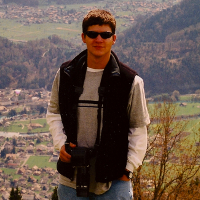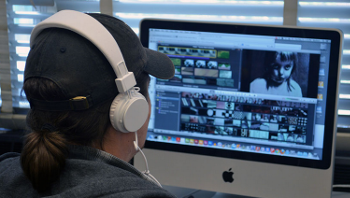Scott Lloyd DeWitt, Brian Harmon, Dundee Lackey, and Christina M. LaVecchia
Introduction | In Context | In Their Own Words | Archive | Credits
Archive: A Screening (Brian Harmon)
This section presents the culmination of the Concept in 60 assignment as realized by the participants of DMAC 2013. As with any archive, it is incomplete. It represents only one of many potential arrangements of this media. This sometimes unfortunate necessity of archiving also offers the potential of surprise juxtapositions and unforeseen connections. I first experienced these films collectively with the rest of my cohort at the annual picnic party and film screening at Scott’s house on May 16 during DMAC 2013. We ate and drank well and laughed a lot. As was the tradition, Scott fashioned a makeshift screen with a plastic tablecloth pinned to his privacy fence, and we gathered around to screen our work. This collection of 24 films is incredibly diverse in tone, style, subject matter, and production value. They are all 60 seconds long.
After spending some more time with this imperfect, charming collection of films, a very simple arrangement for this archive seemed obvious. Thus, in this section of the webtext, I present them alphabetically, as Scott did when we gathered to screen our Concepts in 60 at DMAC. By its nature, a screening is public and includes works of sometimes widely divergent quality. At DMAC 2013, we had all come from different backgrounds and situations, and our films put these different qualities on display. Until the production of this archive and the resulting reconsideration of that evening screening at DMAC, I had taken this common pedagogical technique somewhat for granted. It always just seemed fair to let my students screen their work for each other after a major project.
Screens are all around. The production of multimodal compositions involves navigating multiple screens. Most directly, a producer engages the screen of the camera and the screen of the computer. Less easily experienced is the larger screen of public display. What might be gained (or at risk) from the corporeal experience of communal viewing with peers who have just undergone the same endeavor? I believe that the collective immediacy of banter, laughter, and impromptu context given by each composer after her film is screened can be (perhaps) the most productive part of a multimodal assignment. It provides students (and instructors) the space and access to the kinds of lore (practical knowledge) that, at least in my experience, have been among the most productive moments of learning and teaching. While a thorough examination of the student screening practices within the multimodal turn in composition studies is beyond the scope of this webtext, I’d like to cursorily suggest that there is much more at stake in the screening of student work.
Of course, this archive is a pale reflection of that night’s performative screening. The value of hearing—and feeling—another composer’s composing experience is impossible to reproduce or quantify. However, taken along with the context provided by Scott DeWitt and the meticulous ethnographic interviews by Dundee Lackey and Christina M. LaVecchia, we hope this archive, this digital/virtual screening, might generate some inspiration for instructors experimenting with multimodal production, whether creatively, pedagogically, or theoretically. To be useful, to be relevant, to move forward, it is vital for those invested in multimodal composition to be critically reflective and boldly experimental at every step in the production process. It is our hope that this archive can productively balance instruction and inspiration in presenting a necessarily incomplete slice of our time in Columbus in May 2013.
Concepts in 60: DMAC 2013
the full screening of the concepts in 60
as they would have played in Scott’s backyard
Kara Poe Alexander: “Both/And”
click here to download a transcript of this video
Laura Michael Brown: “Family History”
click here to download a transcript of this video
Brenda Brueggemann: “Moving”
click here to download a transcript of this video
Paul Butler: “Clay Flower Pots”
click here to download a transcript of this video
Erin Kathleen (Cahill) Bahl: “Place-Making in 60”
Kaitlin Clinnin: “5 Stages of Student Response”
click here to download a transcript of this video
Michelle Cohen: “Game in Sixty”
click here to download a transcript of this video
Sara Cooper: Untitled
click here to download a transcript of this video
Theresa Dark: Untitled
click here to download a transcript of this video
Crystal Doss: “Sentimentality in 60”
click here to download a transcript of this video
Torsa Ghosal: “Reflection in 60”
click here to download a transcript of this video
Randy Gonzales: “Concept 60”
click here to download a transcript of this video
Ginger Grey: “Dear Internet in 60”
click here to download a transcript of this video
Alli Hammond: “Hygiene in 60”
click here to download a transcript of this video
Brian Harmon: “Arrangement in 60”
Katherine Heenan: “Home”
click here to download a transcript of this video
Dundee Lackey: “Writing”
click here to download a transcript of this video
Christina LaVecchia: “Invention in 60”
click here to download a transcript of this video
Jeffrey Kaufmann: “Pine Trees in 60”
click here to download a transcript of this video
Maurine Ogbaa: Untitled
Renee Shea: “The Balance Wheel of the Social Machinery”
click here to download a transcript of this video
Eddie Singleton: “Concept in 60: The Science of Sound”
click here to download a transcript of this video
Danielle Williams: “Portmanteau”
click here to download a transcript of this video
Henri Rix Wood: “Academic Values in 60”
click here to download a transcript of this video
Author

The “Archive” (Brian Harmon) collects the Concept in 60 videos that were produced by the members of the 2013 class at DMAC. In a gesture toward the picnic party and screening of the films at Scott Lloyd DeWitt’s house that has become tradition and one of the most memorable parts of the DMAC experience, the films are presented here as a kind of virtual screening. Taken individually and as a whole, they represent an incredibly diverse slice of learning and inspiration from the instructors who are currently teaching and creating multimodal compositions across our discipline.
